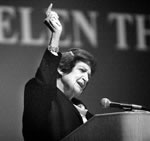Journalists enlighten crowd
Legendary reporter shares thoughts on Bush, war in Iraq
By Rebecca Martin
The current presidential candidates, former presidents’ opinions
about the media and the war in Iraq highlighted a morning of political
discussion featuring journalist Helen Thomas and other professionals in
journalism and public relations.
| 
Former White House reporter Helen Thomas spoke with passion and
wit about her experiences in Washington. Photo by Emily
Tuck |
Thomas, often called “the first lady of the press,” came
to Fresno State for the Roger Tatarian Journalism Symposium on Friday
in the Satellite Student Union. She mentioned her respect for Tatarian,
who died in 1995, and feels strongly that he would dislike the direction
journalism is taking today.
“These days, everyone who has a computer fancies themselves a journalist,”
Thomas said.
Journalists today are afraid to ask difficult questions to a politician,
Thomas said. The press should be a watchdog for the American people, she
said, and no other profession is more the defender of the people than
journalism.
“There is fear in journalists of being called unpatriotic, un-American,
if you ask an important question about Iraq,” Thomas said. “Reporters
are only now beginning to come out of their coma.”
Thomas is critical of the war in Iraq and President Bush’s decision
regarding it and feels the public is being misled to believe Iraq is connected
to the Sept. 11 attacks. The war in Iraq, Thomas said, is because of oil.
“We were told Saddam had weapons of mass destruction, ties to terrorist
networks. Give me a break,” Thomas said. “Of course we had
to fight terrorism after 9/11. But we have to be careful when Bush labels
the war on Iraq as a war on terrorism.”
Thomas’ career in journalism covering presidents began with John
F. Kennedy and has continued through the current president. She made enough
an impression on the presidents that current President Bush banished her
to the back row of seats during press conferences.
Thomas remains critical of Bush partly because he has held only 19 press
conferences during his presidency, the least of any president since television
news began. Journalists who make mistakes in stories are highly criticized
while our politicians are not.
“I’m not defending mistakes,” Thomas said. “I
do say the spotlight should be on politicians who hide things from the
public.”
Journalists can easily be given false information for a story, and it
is their job to make sure the information is credible, Thomas said.
With the presidential debate the night before, Thomas remained critical
of Bush but more positive for Kerry, whom she found in command of his
discussion. In a panel discussion before Thomas’ speech, Kerry and
Bush were the main topic, with various opinions being expressed.
“Bush needs to show he’s the best to handle Iraq. Kerry needs
to show he can do more than that,” said John Howard, one of the
two journalists in the panel discussion. In addition to the two journalists,
the discussion featured three public relations professionals.
Kerry’s need to find consistency and prove he is an effective campaigner
was agreed upon by Trish Conrad, director of public affairs at The Ulum
Group, and Jim Boren, the Fresno Bee’s editorial page editor. In
addition, Kerry needs to shift discussion from the war in Iraq to domestic
issues in order to win the election, panel members said.
Both journalists and public relations professionals agreed image and substance—how
the public views a candidate as a person as opposed to their views on
issues—are each important.
“There’s always gotta be both. There needs to be a combo.
With Reagan, there was such an emphasis on image,” said John R.
Seagle, a public relations professional. Steven Maviglio, involved in
public relations and former Gov. Gray Davis’ administration, agrees.
“It’s difficult if the candidate doesn’t have both,”
Maviglio said.
Providing the whole picture of a candidate may be easier without having
to go through various public relation people, Boren said. While he appreciates
the public relation people showing the positive side of their candidates,
this would not present the public with an equal view.
“Your job is to sift through all that,” Boren said. “If
reporters relied just on that, they wouldn’t have a story.”
Gov. Arnold Shwarzenegger is an example of a politician relying more on
image than substance, Maviglio said.
“He’s out there with the people. Nobody would ask, ‘Hey
Arnold, what’s your energy policy?’ Davis would spend 25 minutes
explaining the energy policy and people would get bored,” Maviglio
said. “The public loves a sound bite. They want to be entertained.”
|

